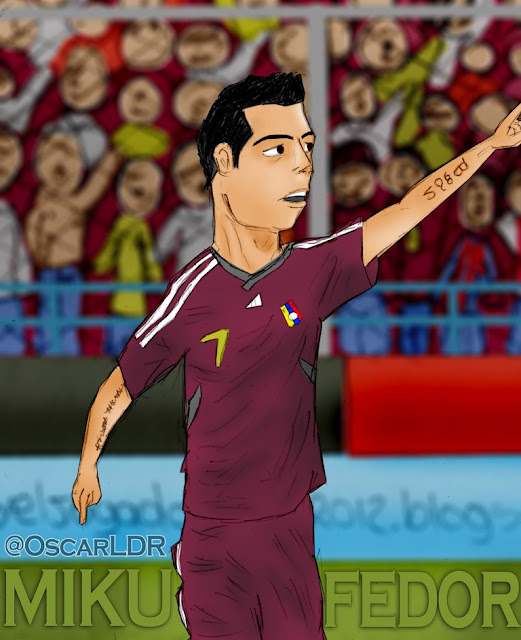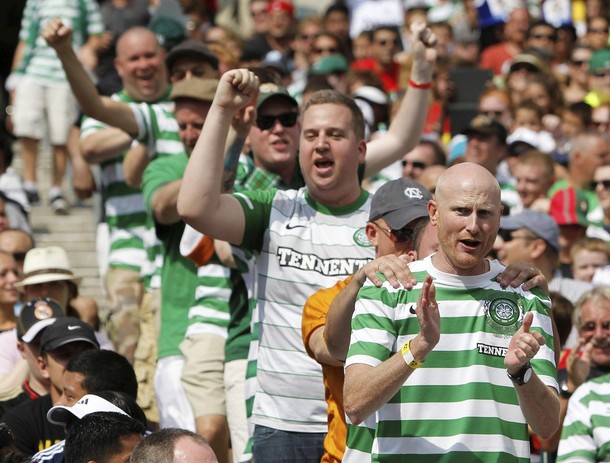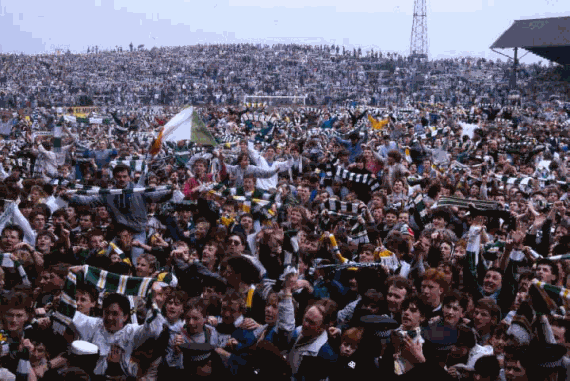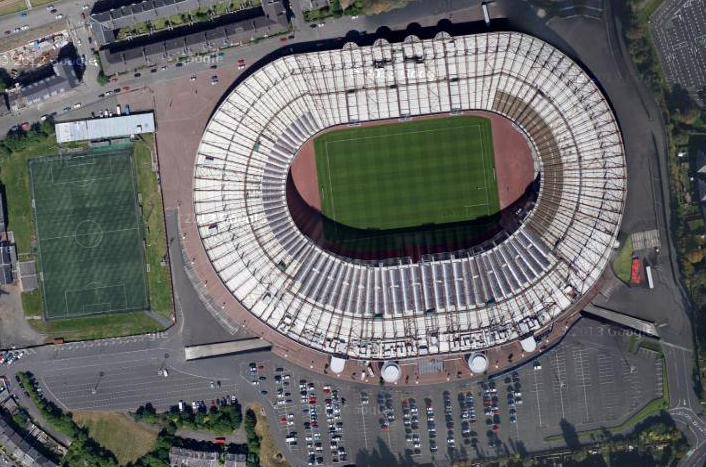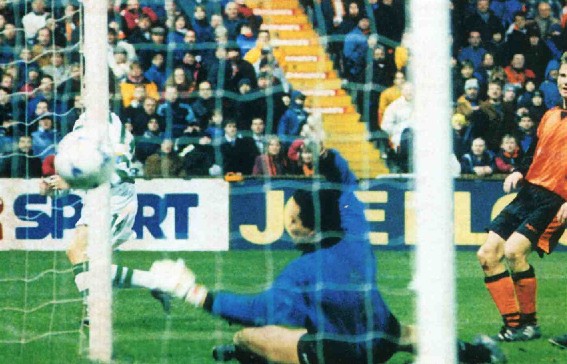Those who watched his interview on Celtic TV will be impressed by Miku’s high level of English; it’s remarkably proficient for someone who has never previously lived in an English-speaking country. From the various interviews that I’ve seen, he appears to me to be an articulate, intelligent and confident individual.
Last year during the Copa America, he openly berated his own sponsor, Adidas, for their unprofessionalism in not supplying the Venezuelan team with sufficient clothing to cope with an Argentinian winter. On another occasion, Miku was very critical of the education policy of the Venezuelan government. While I do not actually agree his viewpoint in the latter case, I think that both incidents seem to demonstrate that he is quite a thoughtful and confident individual. It would be rare for a British footballer to have specific criticisms of British government policy, for example…or God forbid, criticise a sponsor.
As well as English and Spanish, Miku also is conversant in Hungarian. His paternal grandparents fled to Venezuela from Nazi-occupied Hungary during the Second World War. His heritage is a clue to his nickname; Miku, deriving from Miklos, the Hungarian version of his first name.
As a 15 year old boy he was spotted by scouts while on holiday in Europe. He apparently impressed in trials at Real Madrid, Villarreal and Valencia, opting for the latter and he’s been living and playing in Spain ever since. For the next few years he played youth football with small, provincial clubs in and around Valencia before being loaned out to Salamanca in 2005. This was his breakthrough season, as he scored 20 goals, helping them to be promoted to the Segunda División.
Miku was then loaned to Gimnastic and Murcia, as well as playing for Valencia Mestalla, effectively Valencia’s reserve team that plays within the Spanish league structure. Referring to this spell back on the east coast of Spain, Miku made a frank admission to the Spanish sports newspaper, Marca, ‘What I regret is that after my first spell with Salamanca, mentally I just wasn’t there. I didn’t live for football and I was thinking that I’d have a guaranteed future and that I was going to be worth a place in the team. But professional football is so competitive, there are a lot of things that you have to do on a daily basis to maintain yourself among the elite and I struggled to understand that and learn that and it cost me practically two years of my career.’
After failing to make an impact, Valencia allowed him to go on loan once again to Salamanca. As before, Miku excelled at El Helmántico, being Salamanca’s top goalscorer again, this time with 15 goals.
Following Miku’s second successful spell at Salamanca, Valencia then decided to bring him back and incorporate him in their full squad as a back up for David Villa, but only used him sporadically. Miku’s most notable contribution was scoring a hat-trick against Stabaek of Norway in the Europa League. However, pretty soon he was at yet another club, Getafe, in the southern suburbs of Madrid. It was here that Miku has really established himself.
 For the past two and a half years, the Venezuelan has been a regular in La Liga. Furthermore, last year, Miku Fedor was Getafe’s top goalscorer in La Liga with a respectable 12 goals.
For the past two and a half years, the Venezuelan has been a regular in La Liga. Furthermore, last year, Miku Fedor was Getafe’s top goalscorer in La Liga with a respectable 12 goals.
What type of player is he? Well, we shouldn’t expect spectacular flicks, tricks or dribbles. Miku is a different type of player; he is more effective and clinical, rather than being spectacular. Just from watching him on TV, I’d say he’s 6 foot or so and at the risk of sounding like Peter Lawwell, he’s quite robust. Sometimes when watching Miku I often want a little bit more from him, as though he is almost playing within himself. Perhaps though that is just aesthetics, because he definitely has a good work ethic and is pretty selfless when I’ve watched him for Venezuela.
He is accustomed to playing on the counter-attack for his national team. The Venezuelan can drop back and link up well with midfielders and full backs making forward runs. I think he’s quite adept at receiving passes into both his feet or body and retaining possession or coaxing the opposition defender to foul him to gain a free kick for the team. He’ll be far less effective chasing long, hopeful punts upfield-although he has decent pace, I wouldn’t say that he’s rapid.
It’s been remarked that he can play as a winger, as well as being a forward. He can but in my opinion he’s far better as a typical ‘number 9’ type striker…even if he’ll be wearing number 7.
To get the best out of Miku, we’ll want to give him the ball in or around the box, as I think the three best aspects of his game are his clinical and potent finishing, his ability to receive the ball and ‘roll’ the defender and his noticeable composure and calmness when he has an opportunity.
I’ve not seen much of him at all with Getafe, but I’ve watched just about every Venezuela game in the last 3 or 4 years. Venezuela have a distinct, defined style in South America; they are quite pragmatic, play on the counter-attack and are direct. Furthermore, their impressive young coach César Farías places an emphasis on set-pieces and for the forwards to really press the opposition centre-backs. I feel that this is particularly significant, as Miku might well have a similar role for Celtic when we play in the Champions League, especially for away games.
Miku himself probably best describes his tactical role when playing for Venezuela, ‘In the national team, the forwards make a really big defensive effort. We run a lot when defending without the ball and goal chances are less than normal but we are conscious that this function can achieve success for the national team in a collective sense.’
And it has brought success.
 This is the best moment in Venezuela’s footballing history and Miku is a key part of this success. He’s been in the team that reached the Copa America semi-finals, drawing with Brazil along the way. Miku helped Venezuela earn their first ever victory against Argentina last November, and more recently in June he played for Venezuela as they earned a draw against Uruguay at the old Estadio Centenario in Montevideo. Our new Venezuelan has scored 10 goals in 40 games for his country. To put this in the context of South American international football, Carlos Tevez has scored 13 in 59 for Argentina and Radamel Falcao, 11 in 37 for Colombia, respectively
This is the best moment in Venezuela’s footballing history and Miku is a key part of this success. He’s been in the team that reached the Copa America semi-finals, drawing with Brazil along the way. Miku helped Venezuela earn their first ever victory against Argentina last November, and more recently in June he played for Venezuela as they earned a draw against Uruguay at the old Estadio Centenario in Montevideo. Our new Venezuelan has scored 10 goals in 40 games for his country. To put this in the context of South American international football, Carlos Tevez has scored 13 in 59 for Argentina and Radamel Falcao, 11 in 37 for Colombia, respectively
Celtic have signed a La Liga regular and an established international entering his peak. Miku is used to playing intense, competitive games against the best players in the world…and getting good results from these games. Let’s hope that he can do the same for us.
Suerte Miku!
——-
Thank-you very much to Oscar Olivares in Caracas for his fantastic illustrations. Follow him on twitter @OscarLDR and check out his blog http://soyeljugadornumero12.blogspot.co.uk/ for more of his drawings.
You can follow me on twitter @markocooper, if you want to. Hail Hail

